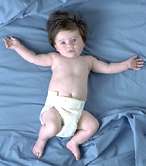Expectant parents can be reassured by findings, researchers say.
(HealthDay)—The risk of birth defects is low among children conceived using assisted reproductive technologies (ART), according to a new study.
Researchers examined more than 300,000 births in Massachusetts between 2004 and 2008. Of those babies, 11,000 were conceived using ART.
Assisted reproductive technologies include fertility treatments where both eggs and sperm are handled, such as in-vitro fertilization, according to the U.S. Centers for Disease Control and Prevention.
Techniques where just sperm are handled, such as artificial insemination, are not considered assisted reproductive technology, according to the CDC.
The ART-conceived children had slightly higher rates of cardiac and non-cardiac birth defects than children who were conceived naturally. But, overall rates of birth defects among ART-conceived children were low, the researchers said.
Rates of cardiac birth defects were 0.82 percent among ART-conceived children and 0.52 percent among naturally conceived children, the study showed. Rates of non-cardiac birth defects were 1.8 percent and 1.5 percent, respectively, according to the researchers.
The study was presented Tuesday at the annual meeting of the American Society for Reproductive Medicine in Honolulu. Findings from meetings are generally considered preliminary until they're published in a peer-reviewed journal.
"While we need to better understand any relationship between birth defects and infertility, it is comforting to confirm that rates of birth defects remain low among those children conceived using assisted reproductive technologies," Dr. Charles Coddington, president of the Society for Assisted Reproductive Technology, said in a society news release.
More information: The U.S. Centers for Disease Control and Prevention outlines how to reduce the risk of birth defects.
Copyright © 2014 HealthDay. All rights reserved.





















